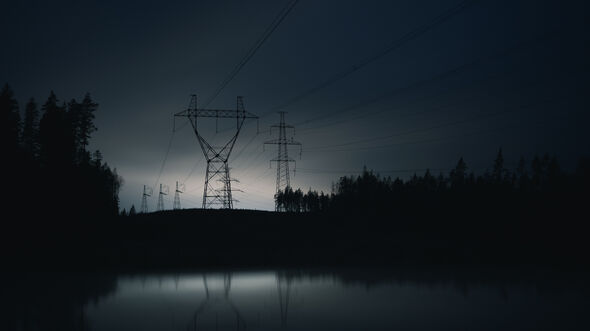
Prof Talk | Will we be left in the dark after 2030?
A plan of action is needed to ensure that the Netherlands is supplied with enough electricity at all times of the day after 2030
After 2030, there will not be enough electricity available in the Netherlands at all times of the day, grid operator TenneT reported earlier this year in its annual report on the security of electricity supply. What will this mean in practice and will we still be able to turn the tide? That is what Cursor asked Han Slootweg, part-time professor in Smart Grids at TU/e’s Department of Electrical Engineering and Chief Operating Officer (COO) of Enexis Group.
The report shows that we will reach a tipping point around the year 2030. From that moment on, there will not be enough electricity in the Netherlands at all times of the day and the situation will only get worse if we do not take action. Can you explain why that is exactly?
“More and more renewable energy sources are being introduced into our energy system, such as solar and wind energy. These energy sources are more sustainable, but unpredictable in nature. Unlike energy generated from coal and gas, you cannot easily control or manage them. We often have enough sustainable energy to keep the Netherlands running. But there are times when it’s not enough, because there is no wind or large clouds cover the sun. A solution would be to store surplus electricity, but that is very difficult, both technically and economically.
For now, we can compensate for the shortage of sustainable energy with power plants. But as we install more solar panels and wind turbines, the operating hours of these power plants will be reduced, making it financially difficult to build new ones. Meanwhile, the existing power plants are getting older and sooner or later, they will shut down, so we will have fewer and fewer power plants.
Around 2030, this will lead to times when there will no longer be enough power plants to meet our energy needs with gas and coal, should the sun and wind generate insufficient energy. And if we’re not careful, this problem will only get worse. This effect will not resolve itself.”
Who will be most affected by this?
“Well, that’s a political question, of course. It’s something we’ve faced before when Russia stopped supplying gas. Gas shortages ensued and discussions arose about questions like: who has priority? And who should stop using gas when the need arises? I think we will have similar discussions about electricity. We might say things like: surely the hospital should keep its electricity. And certain businesses may have to do without for a while. For example, how important are casinos, really? They might have to be taken off the grid temporarily. Ultimately, this is a conversation we as a society need to have with each other. And it’s not going to be an easy one.”
You’re talking about businesses. Does that mean that ordinary people don’t have to worry about being left without electricity (for part of the day) for the time being?
“This will primarily concern large consumers and businesses, so it will not directly affect households. However, people may notice that electricity will become more expensive. What’s important to note is that a lot of people currently have a fixed rate. But because of all of these developments, we may be forced to shift towards flexible rates, because ultimately, the energy price is a reflection of how much energy is available at that time. In addition, this can be an important incentive for consumers to change the way they use energy. For example, someone with an electric car might decide not to charge it for now because it’s too expensive. Or you might choose to wait a few hours before running your washing machine because you know that electricity will be cheaper then.
So it may well be that the consumer will start feeling the effects of price fluctuations in the system more clearly and that these fluctuations will increasingly be passed on to the consumer, allowing them to adjust their usage accordingly."
Can we still turn the tide? And if so, who should do that and how?
“Technically, many things are possible. We can keep old power plants running longer. That will cost some money, but a major outage may well cost a lot more, so we should weigh these things against each other. In some countries, power plants are paid for their availability. So you don’t just give them money when they produce electricity, but also for being there, ready to use when needed.
But underlying this is a kind of philosophical question. Some people say: this is simply a market of supply and demand. If electricity prices skyrocket, someone will be interested in building a power plant. But if it ends up costing more to build a power plant than to let people sit in the dark, then we should let people sit in the dark. That’s the economic reasoning, but I wonder: is that reasoning always valid in the context of the energy system? Personally, I believe that the government should take a more active role in this regard. And that we should take a more technical approach to the question: how do we keep the lights on in the Netherlands? What exactly do we need in terms of wind turbines, solar panels, battery banks and – for my part – nuclear power plants? We need to discuss that together.
The next question is: how do we create regulations in order to establish the system? In The Hague, people reason the other way around. First, we make all kinds of rules that are politically desirable or that make economic sense, and then we hope that those rules will lead to a solution to the problem. I would rather approach it from the other side with the question: what makes technical sense here? Only then can you create rules to move towards that.”
What do you see as the biggest obstacle when it comes to creating effective solutions?
“Theory often collides with reality. We’re talking about energy supply now, but we also have to consider whether the energy can ultimately reach the customer. Because we might have electricity, but we have far too little grid capacity at the moment. And if the grid is overloaded, preventing you from delivering that energy, it’s of no use.
We’ve created all sorts of rules about how grid operators should work; it’s all well thought out in theory. But in practice, our electricity grid is overly strained. Fortunately, things are slowly changing. If a major issue impacts everyone, we’ll see a shift in dynamics.”
Do you dare to be optimistic when it comes to the future?
“Ultimately, we’re all in it together, we all have common sense, and of course we won’t blindly race towards this cliff that we can already see coming – fortunately, we’re all a little too smart and sensible for that. But my concern is: will that common sense kick in on time? Unfortunately, that didn’t happen with the electricity grids. There’s a lot of common sense now, but it’s coming too late. I would have liked to see that four years ago. So I hope we learn from this and that we can intervene in time. And in time means now.”
Suppose we don’t manage it in time. Should we really be worried?
“Then it’s possible that a company has to be shut down for a whole day five times a year because there’s no more power. You might alternate between companies, letting one be affected on one occasion and another on the next. Of course, nobody likes that and you want to avoid that if possible. But meanwhile, there are areas in the world that are facing much bigger problems. So we shouldn’t act like the world is ending or that we’re reverting back to the Stone Age, because that’s simply not the case.
I always try to broaden my perspective and then I realize: our situation isn’t that bad. And we have enough people, resources and opportunities to steer things back in the right direction – albeit with some delay or slightly less optimally than desired. So let’s just stay optimistic, but also get to work. Unbridled optimism without action seems very unwise to me. We know it’s possible, but we need to actually make it happen.”
How do you view this challenge from your dual role as COO at Enexis and professor at TU/e?
“What I really like personally is that it allows me to work on it in both theory and practice. At TU/e, I mainly work on theoretical innovations and developments in the long term; at Enexis, I try to contribute to the overall effort in a much shorter term. I think those two things complement each other very well. I feel really privileged to be able to contribute to that course from different perspectives.”



Discussion